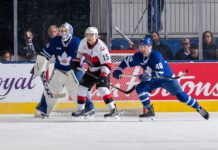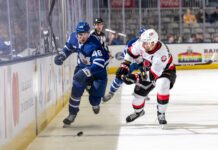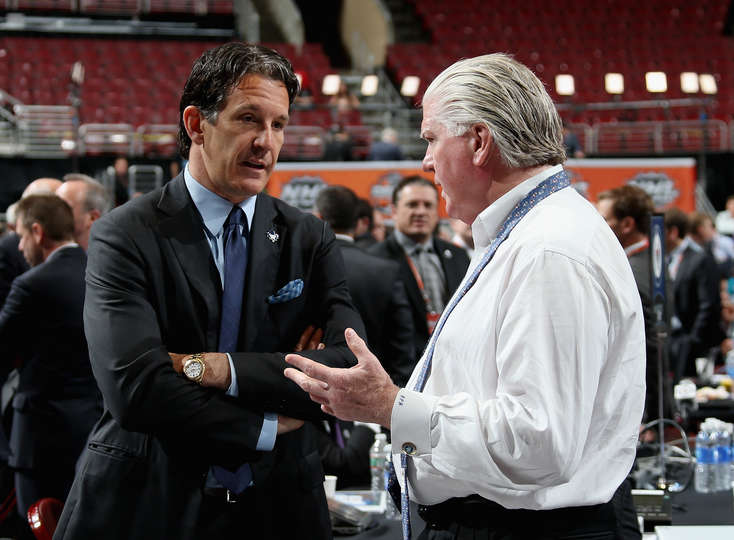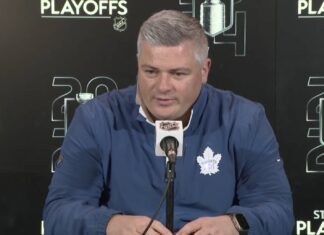Toronto Maple Leafs President Brendan Shanahan joined Hockey Central on Thursday afternoon to discuss how the organization is handling the suspended season and social distancing during the current pandemic.
How is life lately at your office? What does a day-to-day for Brendan Shanahan look like right now?
Shanahan: Like a lot of people, my office is my home. I was talking to some people at the league office yesterday as well. We are all sort of setting up makeshift offices in our home and we are getting used to meetings or conference calls that involve kids barging in or requests being made for food. Like a lot of families right now, we are practicing the stay-at-home and self-quarantine that the country has asked us to do.
For us as a family, I’ve got three children. I’ve got two 17-year-olds and a 15-year-old and my wife. We are sort of just trying our best to get used to the new normal, like a lot of families. We will occasionally go out together for a walk, but generally speaking, we have been inside.
I think it was especially tough on my kids to make the adjustment the first few days, but they have really settled in and have been really fantastic. We have tried to find a bit of a silver lining in this. When we aren’t watching the news and hearing some of the scary and horrific stories that are going on around the world, we do try to do huddle up and watch a movie together and spend some more quality time together — try to find some sort of bonding through this moment.
With everybody separated in every organization, how difficult is it to stay in pushup position here so that when you get the go-ahead, you can flip the switch and get back to playing again? How difficult is it to keep it all together right now?
Shanahan: I’ll say this: I always found it, as a player and an executive, amazing how you go from a playoff game in which you have been together so closely, you are planning your next game, and you might even be planning the hotel of your next series, and even when you do win or go all the way to win it… The shocking thing, with any regular season, is how quickly it just drops. Whether you win the Stanley Cup or you get eliminated in the playoffs, you go from seeing these people every single day and having this routine with meals and workouts, to two days later everyone is gone.
On the flip side, guys go back to their cities, their hometowns. Most of them now train year-round. They are set up usually at their homes to have some sort of ability to prepare for a regular season. I think what is going on now — and I’ve spoken to some players — is that obviously this is taking them out of their normal routine. That is probably the strangest part about them staying in the pushup position. I think the players, similar to everyone in society, are just trying to figure this out. It is evolving constantly. None of us feel normal.
As one of our players said to us yesterday, they are viewing this time as a different offseason. As one of them said to me yesterday, their message to each other is to treat this time in their gyms at home to get strength gains so that, if and when we do come back, they will be ready to go. They are just trying to wrap their heads around the potential, depending on when we come back, of having a different season and a different offseason and potentially a different playoff.
Everyone in all lines of work relies on a routine to some extent. There is no one that relies on routine more than a professional athlete. That has got to be a big adjustment.
Shanahan: It is. We’ve talked about that. Kyle has been fantastic through this as the guy who talks to the players and our staff on a day-to-day basis. I’ll sort of reach out to different people and different players and speak through Kyle. That is one of the things that was addressed. Everyone craves routine — athletes especially. They are used to working on a clock. When they talk to players that have retired, that is what they say: The biggest adjustment to life after hockey is not getting that schedule and that routine put in front of you where you roll up in September and someone hands you a schedule and says, “This is where you’ll be on the third Monday of April.”
I think that the guys are getting used to it. I think the guys are getting adjusted to it. The biggest message we’ve said to all of them is that the best thing you can do for your community right now is take care of yourself, take care of your loved ones, and keep yourself safe. I think everyone is doing that. Where we can and if we can, be leaders in the community and reach out. I think you’ll see that now that players have gotten settled — players are calling and they want to be able to contact our fans.
It’s not that any of us have answers or any of us are calling radio stations because we have news to report, but I can just tell you that from me, honestly, I have probably never listened to hockey shows than I have now. I am just craving to hear people talk about it. I’ve got these news stations on all the time. It’s 24/7 in our house. It is a nice break for me when I can hear you guys tell some good hockey stories.
Is there any chance you can take some positives out of this? It was a bit of a tumultuous season for you with the coaching change in there and some ups and downs along the way. Is there any sense for you at all that this could work as a bit of a reset if things are able to come back?
Shanahan: Quite honestly, that is not my mindset. I am not thinking about what is the positive in this as far as our season or changes we’ve made or the style that we play or the percentage of our power play or penalty kill. That is not how I am viewing this in any way. I think there is a bigger perspective here, certainly, that goes beyond hockey and sport. It is our job to be ready so that if things do change in the world and things do start to improve and open up, we’re ready to go as quickly as possible. It would be great for the country, especially, whenever it is that we see any sense of things going back in the direction of the way they were just a short while ago. That would be tremendous for the psyche of the entire country.
The capital B business of the NHL is suspended right now, but the lower-case b business by way of the teams does continue. Is there any update on a player like Kyle Clifford? We saw some indications from his camp that there would be a willingness to stay past his contract.
Shanahan: He has been fantastic for us. I said a few weeks ago, when we were back in LA and he was playing in LA for the first time since the trade, that he’s made a tremendous difference to our group. I think he was just starting to get comfortable as well. Especially when you play the role he does, you have to play it with your heart on your sleeve. It rips the heart out of a lot of guys when they get traded. In my experience, it is even more so for guys that play physically and that take on the responsibility as sort of the team’s big brother. I think he was really starting to get comfortable and starting to find his voice in the dressing room.
Anybody I talk to in the LA organization — Nelson Emerson, Rob Blake — talk about how he holds people accountable. That is not something that you come in in your first week in the dressing room and start doing. I love hearing he is interested and we are certainly interested as well. He has been fantastic and is just a great person.
People like to — and deservedly so — assess all teams in the NHL and point out where your weaknesses are and your shortcomings, and we recognize and see those things, too. It’s just that the rest of the NHL isn’t a grocery store for us to walk in and pluck what we want when we want. But that was certainly a part of our game that we wanted to address and we wanted to address it with someone of that kind of character and with his ability to also play the game and be an effective player. The interest is mutual.
Having the ability of someone like him — he’s won a couple of Stanley Cups, and you learn lessons when you go through that. It’s one thing to have someone in your staff that has won a Cup or a coach that has won a Cup, but any time you have the ability to find players… and I wouldn’t even just stay Stanley Cup. I wouldn’t diminish the experiences of people who have won Memorial Cups or Calder Cups. Any time that you see a player that has a habit throughout his lifetime of hockey of finding a way to play hockey in May and June, there is probably something that player has picked up and learned along the way.
You have a lot of balls in the air as Team President during a break like this. There is checking into building availabilities. What sort of other things would be occupying your time to try to get things ready for whenever you get the green light?
Shanahan: It is really hard for everybody right now. We just had a Team Presidents call yesterday with the NHL. I think right now that is one of the things that everyone is putting into place. Whether it is ticketing departments for all of the NHL teams, or Team Presidents, or General Managers, I think the communication right now and having a constant flow of communication — a weekly meeting where we can all get on the phone and discuss what is going on in each of our cities — is really important. At this point, we are all still trying to figure it out. We don’t have a date set. We don’t have a specific target set.
To the general point, what you try to do is — even though we are realistic and see that nothing is happening in the next couple of weeks — to try to make sure that your organization is ready to go. The NHL just announced that they are making changes and postponing the Awards show and the Draft and things like that. There are people within the organization — names of people you wouldn’t even necessarily know — that have jobs to do there, whether it is calling hotels and rebooking them or postponing them. You’re just trying to sit back and brainstorm with Kyle on what we are missing and what we haven’t thought of and what we can do. For the most part, there is not a lot any of us can do.
One of the biggest things is, now that the players are mostly situated — and that probably took up a lot of the time over the last couple of weeks, just getting them situated and making sure they were safe — it’s also the staff and the entire workforce that you care about. They have a lot of questions and concerns, like everybody.
I think this is really one of those moments where nobody in the entire world is excluded from this. Everybody is feeling this and feeling the empathy and the desire. That is one of the things that I feel more than anything: The desire to do more. That is really sort of frustrating when someone says the best thing you can do is stay home. I think it is in our DNA to want to do more and go do more. It is the right thing to do, but that is sometimes frustrating and I bet it is frustrating to a lot of our players as well.
Is there any issue with European hockey players going back to Europe? Some players have gone back. Some teams have allowed them. Do the Maple Leafs have a certain perspective on that?
Shanahan: I think most of the guys got back early. You’ve got to adhere to whatever the travel bans are of each specific country, but the short answer is we want our players to be in a home in which… Some of the guys have homes in Sweden or different parts of the world, where it’s their offseason home and where they are best set up to do training. They come to Toronto for the season. They don’t have their family support group around them. They might have a little condo. Because they travel so much, for guys that are single or have a girlfriend and no children, the situation sometimes in their home countries is more conducive to their mental and physical wellbeing. We absolutely support them in doing that.
We have some players that are still rehabbing. It’s important that we give them the ability to rehab with our staff. That is still going on for a couple of our guys. That is going on in all NHL cities. We were working out at one facility and we had to change to a different one. It is a skeleton crew and it is a couple of guys, but it won’t be long before even those guys, around the NHL cities, are back in their homes.


































